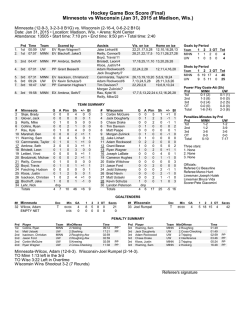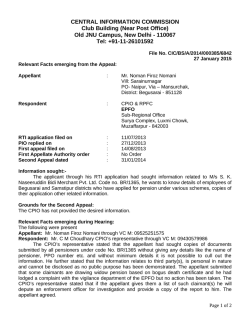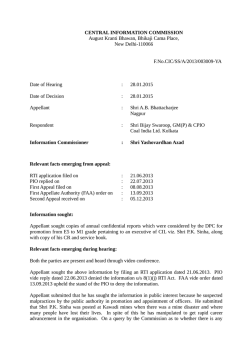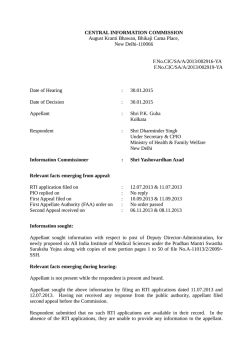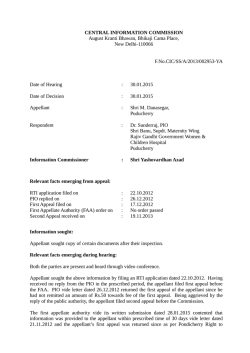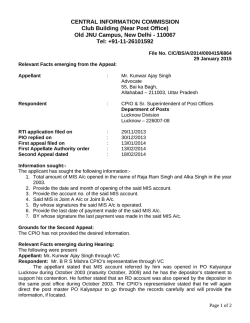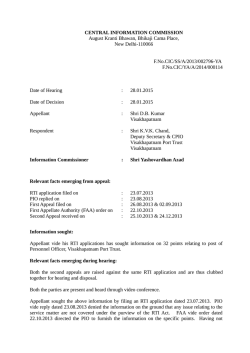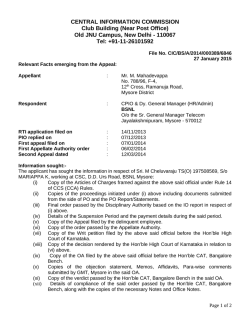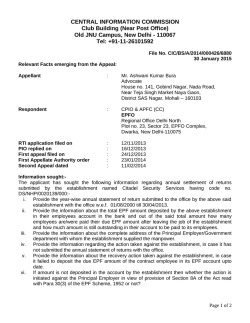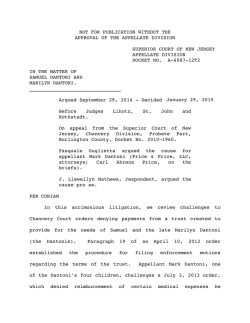
Gale Allen Rachuy, Appellant, vs. Duluth Police
This opinion will be unpublished and may not be cited except as provided by Minn. Stat. § 480A.08, subd. 3 (2012). STATE OF MINNESOTA IN COURT OF APPEALS A14-0622 A14-0970 Gale Allen Rachuy, Appellant, vs. Duluth Police Department Property Room, et al., Respondents. Filed February 2, 2015 Affirmed Smith, Judge St. Louis County District Court File No. 69DU-CV-13-2818 Gale Allen Rachuy, Duluth, Minnesota (pro se appellant) Gunnar B. Johnson, Duluth City Attorney, M. Alison Lutterman, Deputy City Attorney, Duluth, Minnesota (for respondents) Considered and decided by Smith, Presiding Judge; Schellhas, Judge; and Hooten, Judge. UNPUBLISHED OPINION SMITH, Judge We affirm the district court’s denial of appellant’s petition for return of property held by law enforcement because the district court did not clearly err when it found that the requested items were never possessed by law enforcement and because the district court did not err by ordering the destruction of items used to commit appellant’s criminal offense. We also affirm the district court’s denial of appellant’s motion for costs because appellant is not a prevailing party. FACTS In November 2013, appellant Gale Allen Rachuy petitioned the district court to order respondent Duluth Police Department Property Room to return various items of personal property. Law enforcement seized the property as part of a 2010 investigation into Rachuy’s issuance of worthless checks drawn on a closed account. Rachuy has an extensive criminal record, including convictions for issuing worthless checks. The district court denied Rachuy’s petition on March 5, 2014. It found that most of the items listed in Rachuy’s petition had already been returned to him. The district court also found that Rachuy had failed to present any evidence that two items—a laptop power cord and a vehicle title—had ever been possessed by law enforcement agents. The district court ruled that the four remaining items—two books of blank checks, check stock,1 and a suspended Minnesota driver’s license—were “derivative contraband” under Minn. Stat. § 626.04(a)(3), (4) (2012), and it ordered them to be destroyed. Complying with the district court’s order, the Duluth Police Department Property Room destroyed the items on March 7, 2014. On March 20, 2014, Rachuy moved the district court to order the Duluth Police Department to search its records for evidence of additional items it had seized from 1 Although neither Rachuy nor the state specifies what “check stock” refers to, it appears to refer to blank paper of the type used for checks, but lacking address, account, or other information normally printed on blank checks. 2 Rachuy but failed to include in its inventory. On March 24, Rachuy moved the district court for amended findings, again alleging that police officers had failed to inventory seized items. The district court denied both motions, ruling that they were untimely and submitted in violation of district court rules. On April 7, 2014, Rachuy moved the district court to order the police department to return a power cord and additional check stock that he alleged it was holding. Although the district court scheduled a hearing, the record does not contain any indication that the district court considered or decided this motion. On April 14, 2014, Rachuy moved the district court to award him costs he incurred in his petition. The district court denied his motion, ruling that Rachuy was not a “prevailing party” and was therefore not entitled to receive costs. Rachuy appealed the district court’s March 6 order in April 2014. By order on May 2, 2014, this court directed the parties to submit additional briefing addressing whether Rachuy’s appeal should be dismissed as moot. After receiving memoranda from both parties, a special term panel of this court allowed Rachuy’s appeal to proceed but invited this panel to “assess whether the issues appellant raises . . . are moot.” Rachuy appealed the district court’s denial of his costs motion on June 9, 2014. This court consolidated his appeals, directing Rachuy to file a statement of the case and brief addressing the issues in his June 9 appeal. On August 29, Rachuy filed a supplemental brief, but the brief addressed issues related to both the district court’s March 6 order and its denial of his motion for costs. On December 4, 2014, this court granted the department’s motion to strike the portions of Rachuy’s supplemental brief 3 that address issues other than his motion for costs and proffer documents not contained in the district court record, but it denied the department’s motion to dismiss Rachuy’s June 9 appeal. DECISION I. We first consider whether Rachuy’s appeal is moot. The department argues that those portions of Rachuy’s appeal that relate to the items that the district court ordered destroyed should be dismissed because the only relief available—return of the seized items—is no longer possible. See Minn. Stat. § 626.04 (authorizing no remedy other than return of seized property). “We generally dismiss a matter as moot when an event occurs that makes a decision on the merits unnecessary or an award of effective relief impossible.” Limmer v. Swanson, 806 N.W.2d 838, 839 (Minn. 2011) (quotation omitted). But we may consider a moot issue when “the issue is capable of repetition yet evading review,” In re Schmidt, 443 N.W.2d 824, 826 (Minn. 1989) (quotation omitted), “because the challenged actions were too short in duration to be fully litigated before they were rendered moot,” Limmer, 806 N.W.2d at 839. The mootness exception applies here. The department states that both the check stock and blank checks are “considered contraband” that “would be destroyed under normal procedures” “because they cannot be legally used.” Relying on this reasoning, the district court found that the items were “derivative contraband” and ordered that they be destroyed. Because the district court did not stay this aspect of its order to allow appellate review, the department destroyed the items almost immediately after the district 4 court’s order. Since the department has stated that its routine procedure would require destruction of similar items in future cases, the issue Rachuy presents is likely to recur in some form in the future. And since this case demonstrates that destruction can occur before any meaningful opportunity to seek appellate review, it is clear that the actions he challenges can occur too quickly to be fully litigated. Accordingly, we consider the merits of Rachuy’s challenge to the destruction of items notwithstanding its mootness. II. Rachuy challenges the district court’s determination that various items, including a laptop power cord and a vehicle title,2 were never in the possession of the department. We review a district court’s factual findings for clear error, reversing “only if, upon review of the entire evidence, [we are] left with the definite and firm conviction that a mistake has been made.” Gjovik v. Strope, 401 N.W.2d 664, 667 (Minn. 1987); see also Minn. R. Civ. P. 52.01. Rachuy points to no evidence in the record 3 establishing that the department seized or possessed the power cord or the particular vehicle title he identifies. Rachuy also repeatedly accuses department officials of lying and stealing. But the district court found that “everyone has worked in good faith to identify what is being 2 Rachuy also alleges that the department failed to return additional computer accessories, but these arguments and related factual assertions have been stricken from the appeal by order of this court dated December 4, 2014. 3 Rachuy proffers several additional documents in his supplemental brief. These documents were stricken by order of this court dated December 4, 2014. Even if we considered these documents, they do not provide clear evidence that the department ever possessed the items he claims. The vehicle title referenced in the stricken documents relates to a different model vehicle with a different manufacturer and year. And no authenticated document separately identifies a laptop power cord among the items seized or held by the department. 5 requested, and what has been returned,” and we defer to its credibility determination. See Sefkow v. Sefkow, 427 N.W.2d 203, 210 (Minn. 1988). As such, we affirm the district court’s conclusion that the department never possessed the items. Rachuy also challenges the district court’s application of section 626.04(a) to declare the blank checks and check stock to be “derivative contraband” subject to immediate destruction.4 We review the district court’s interpretation of a statute de novo. Swenson v. Nickaboine, 793 N.W.2d 738, 741 (Minn. 2011). When interpreting statutes, we seek “to ascertain and effectuate the intention of the legislature.” Brua v. Minn. Joint Underwriting Ass’n, 778 N.W.2d 294, 300 (Minn. 2010) (quotation omitted). When ordering the retention and destruction of the check stock and blank checks, the district court reasoned that they were “derivative contraband” because, although they were legal to possess generally, Rachuy’s proven propensity to issue worthless checks on closed accounts indicates that he would likely use them illegally. See Johnson v. Multiple Miscellaneous Items Numbered 1-424, 523 N.W.2d 238, 240 (Minn. App. 1994) (holding that “the legislature intended ‘contraband’ to include property which is illegal for the particular offender in question to possess”). But although it undoubtedly would be illegal for Rachuy to use the blank checks or check stock to issue new checks, there is no indication that the legislature intended to declare property to be contraband that is illegal to use for a particular purpose, however obvious such purpose may be for a particular offender. Cf. Minn. Stat. § 609.531, subd. 1(d) (2014) (defining “contraband” as 4 Rachuy does not challenge the district court’s order as it relates to the suspended driver’s license. 6 “property which is illegal to possess under Minnesota law” (emphasis added)). Such an extension of the term “contraband” would lead to absurd results. For example, if police investigating a homicide committed with a golf club seized the entire set, and if the defendant was later convicted of having used the 9-iron to commit the offense, the remaining clubs in the set could be “contraband” subject to retention and routine destruction. We therefore reject the extension of the word “contraband” to include items where an anticipated use would be illegal in addition to mere possession. Rachuy’s argument nevertheless fails. “We will not . . . reverse on appeal a correct decision simply because it is based on incorrect reasons.” Kahn v. State, 289 N.W.2d 737, 745 (Minn. 1980). In addition to authorizing destruction of contraband, the seized-property-disposal statute authorizes retention and destruction of property that “may be subject to forfeiture proceedings.” Minn. Stat. § 626.04(a)(2). Property subject to forfeiture includes items used to commit or facilitate a designated offense. Johnson, 523 N.W.2d at 240 (citing Minn. Stat. § 609.5312, subd. 1). Issuance of worthless checks is a designated offense. See Minn. Stat. § 609.531, subd. 1(f)(3) (2012) (listing Minn. Stat. § 609.528 as a designated offense subject to forfeiture statutes). Rachuy used the supply of seized blank checks and check stock to issue worthless checks. We therefore conclude that the property was subject to forfeiture 5 and affirm the district court’s destruction order. 5 The fact that no forfeiture action was before the district court is not relevant because the statute requires only that the property may be subject to forfeiture in order for it to be retained by law enforcement or destroyed by order of the district court. 7 III. Rachuy argues that he is entitled to receive costs because he is the prevailing party in litigation, as demonstrated by the fact that the department returned items to him. “The prevailing party in a civil matter is entitled to recover costs and reasonable disbursements.” O’Brien v. Dombeck, 823 N.W.2d 895, 901 (Minn. App. 2012) (citing Minn. Stat. §§ 549.02, subd. 1; .04, subd. 1). We review a district court’s decision whether to award costs to a prevailing party for an abuse of discretion. Id. But to the extent that an appellant’s argument requires interpretation of a statute, we review the district court’s interpretation de novo. Id. “The prevailing party in any action is one in whose favor the decision or verdict is rendered and judgment entered.” Borchert v. Maloney, 581 N.W.2d 838, 840 (Minn. 1998). As the district court noted, Rachuy was not a “prevailing party” in his petition because the district court denied it. He was therefore not within the scope of the statute allowing the district court to award costs. The fact that he received most of the items he claims prior to filing his petition highlights the lack of merit in the petition, it does not transform him into a prevailing party. We therefore affirm the district court’s denial of his motion for costs. Affirmed. 8
© Copyright 2026
